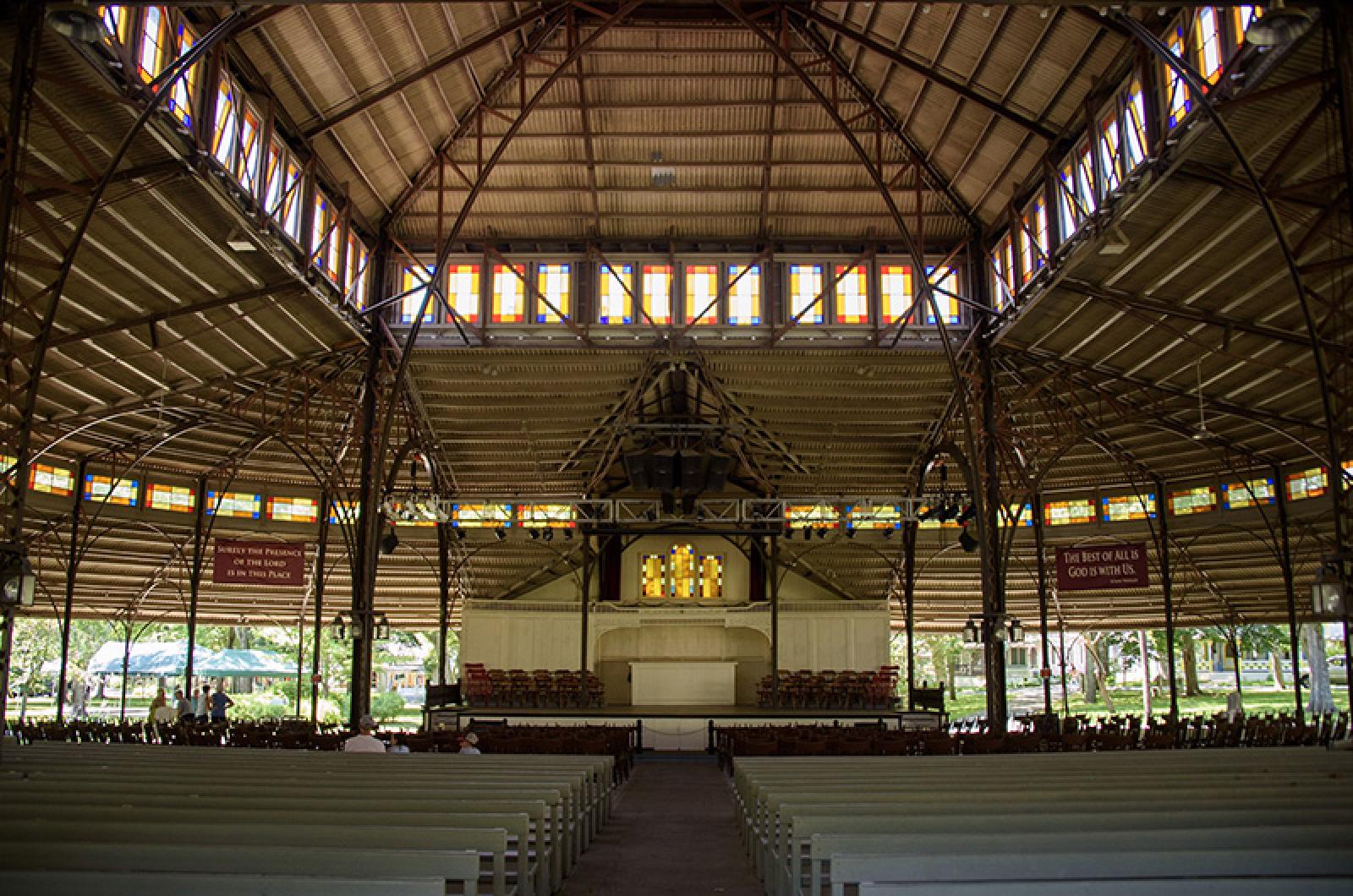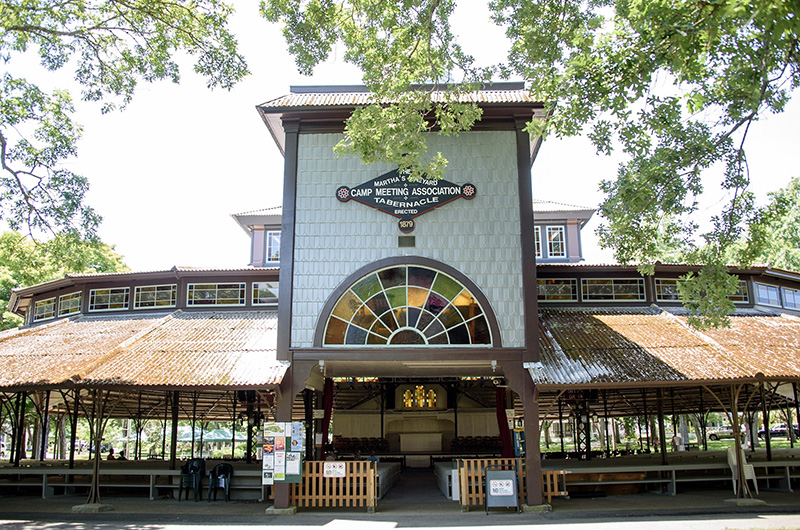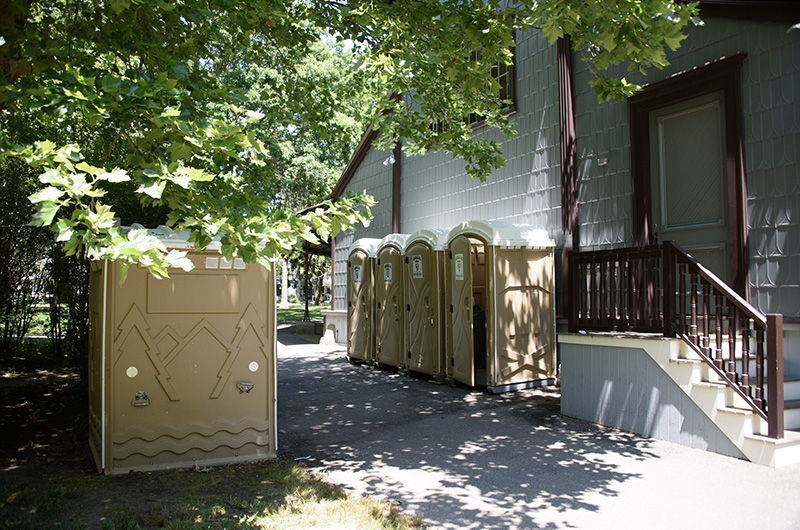The Martha’s Vineyard Camp Meeting Association has sued the Oak Bluffs planning board, seeking to reverse a set of conditions the board attached to the recent approval of a building addition and roof replacement at the Tabernacle in the heart of the Camp Ground.
Filed in the Massachusetts Land Court on July 11, the complaint claims the planning board exceeded its authority when it imposed the conditions, which it says are so restrictive they amount to a denial of the project. It also claims that as a religious, educational nonprofit, the camp meeting association is exempt from zoning.
The five members of the Oak Bluffs planning board and the town of Oak Bluffs are named as defendants.
The camp meeting association (MVCMA) wants to build a 1,300-square-foot addition on the back of the Tabernacle that would house 10 bathrooms, a back stage area for performers and a climate-controlled space to store a grand piano that is used for events. Part of a larger, years-long five-phase restoration, the project also includes replacing the roof on the Tabernacle.
The project was reviewed by the planning board in early June as a site plan review. In the end the board voted 3-0 to approve the work, but a condition requires the camp meeting association to show evidence of cooperation with the town wastewater department for connecting the bathrooms to the town treatment plant. A second condition requires the association to hire a consultant to evaluate the storm water management plan.
The 11-page court complaint takes particular aim at the conditions, calling them “vague and indefinite,” saying they are “ . . . unreasonable and beyond the MVCMA’s control and depend on the actions of third parties.”
The complaint details the history of the project, which has cleared numerous regulatory hurdles, including the Martha’s Vineyard Commission, the Oak Bluffs conservation commission and U.S. Secretary of the Interior.
It also recounts the rich history of the Camp Ground, whose religious roots date to the late 1800s, and the Tabernacle, a 16,000-square-foot wrought-iron, open-air structure that was built in 1879 and was named to the National Register of Historic Places in 2005. The pavilion has natural acoustics that allow sound to carry with no amplification.
“The Tabernacle shelters the original consecrated preaching area of 1835 and has been the hub of religious and cultural activities on Martha’s Vineyard for well over a century,” the complaint says. “Since its opening, the Tabernacle has been in continuous use for religious and cultural activities.”
The complaint says that installing permanent bathroom facilities will allow the association to eventually end the use of portable toilets in the summer months, and will further help meet a goal laid out in the 2019 comprehensive plan for the town.
The need for a wastewater connection has been contemplated all along in prior agreements with the town, the complaint says.
“Initially, these restrooms may be made plumb ready until the town has the capacity in the sewerage system that serves Wesleyan Grove under the terms of a 1993 memorandum of understanding through which, among other things, the MVCMA provided the town with an easement to build a pump station on MVCMA property,” the complaint says.
The complaint asks the land court to nullify the conditions and award attorneys’ fees and costs.
MVCMA is being represented by attorneys Kathleen M. Heyer and Gareth I. Orsmond at Pierce Atwood in Boston.
Speaking to the Gazette by phone this week, planning board chairman T. Ewell Hopkins said the town will respond to the appeal.
“We will read their appeal, we will answer their appeal,” Mr. Hopkins said.
He also was critical of the suggestion that the camp meeting association is not subject to zoning, since it has accepted Community Preservation Act money for the long-running Tabernacle restoration project.
“If they’re arguing they’re exempt from local zoning . . . it begs the question of the Community Preservation Act funds they’ve received from the town,” Mr. Hopkins said. “Does this invoke a conversation for previous funding awarded to this project?”
In a statement issued July 12, the camp meeting association took a different view.
“The MVCMA appreciates that the planning board approved the Tabernacle restoration phase [five] project, but the conditions placed on this approval introduce uncertainty that prevents the MVCMA from meeting the Tabernacle preservation goals for the future,” the statement said in part. “The conditions imposed by the planning board have led to the difficult decision to appeal their action to preserve our rights and help work towards a mutually beneficial solution.”
This marks the second court appeal of an Oak Bluffs planning board decision this summer. In early June the regional high school filed an appeal in superior court after the planning board had failed to gain a majority vote on the bitterly-debated school athletic fields overhaul. The 2-2 vote meant the plan was denied.









Comments (42)
Comments
Comment policy »